Starting a Special Needs Team
I am a firm believer that every person on the face of the earth should be able to do whatever they desire to do (without breaking the laws, infringing upon another’s rights or being unsafe), regardless of disability or physical limitations. I also am the co-owner of an adult day service for the developmentally disabled. The members of my day service do many different things – bowling, softball, basketball, work, and many other activities that the rest of us take for granted. So when our gym had a special needs team from another now-defunct gym “merge” into ours, I had been excited and was on board to help with the team any way possible. As I began to see these determined athletes work at the sport of all-star cheerleading, I realized that EVERY gym should offer this opportunity to those in their community with any sort of “special needs”. Hence the writing of this blog.
Starting a special needs team in your gym is not something difficult; it actually is something that is rather simple to do if you know where to start. What I would advise doing is first establish your coaching team. A team is best because once you begin this program you need to ensure that you have practice every week during the time you have determined to be their “season”. Our gym’s team goes from September thru March. If you schedule practice, you will need to make sure that the practice is run each week as scheduled. Canceling because a coach is sick is not going to do well for them that is the reason for the “coaching team”. If one coach can’t be there another one can step up and run the practice. Consistency is the key in all of this. The more you make it consistent the better it will be for the athletes that participate.
Next determine the time and day of the week you wish to have practices. This will take being familiar with the basic scheduling of such things in your community such as Special Olympics and other popular happenings in that area of the population. Knowing that typically Fridays are when respite exchanges happen and the days that the Special Olympics sport that is in season practices will also be a factor. Our gym has practices on Sundays for an hour in the evening. This works out for our athletes and the gym practice schedule. Our Special Olympics organization in town typically practices sports on Tuesdays and Thursdays, and their competitions are held on Saturdays, so those days are out. We examine the “popular participation” sports for Special Olympics and try to work within those schedules. In our area, bowling and basketball are two very big sports. We are careful to work around those competition schedules, making sure to schedule our competitions we attend around them.
I would greatly encourage getting close to your local Special Olympics organization. In our city it is run out of the YMCA. Anyone can be an organizer of a Special Olympics organization if you go through the proper process as spelled out by the National Special Olympics governing body. Typically the high schools and YMCAs in the nation incorporate Special Olympics into their organizations for their participants. We were able to contact the supervisor of the Special Olympics branch of the YMCA and ask them to send out information along with their information to their participants. Getting the information into the area schools was also a great way for us to get exposure to our “base”.
A big question is about charging; what to charge for the program, or even IF to charge. Knowing the population as I do there are two pieces of advice I will give you – they are on fixed incomes typically and that is NOT a lot every month, and if you charge something you will have greater commitment from the athletes and their families in participation than if you don’t. Offering something “free” is a generous offer, but this also makes the appearance of opting to attend practice/competitions or not. If you are a person that is in cheer regularly you also understand the frustration of missing athletes for practices as well as competitions. Every person is important and special needs teams are no exception. We do make allowances for members to miss time, with a sheet going home and athletes being able to let us know which competitions they can attend and which ones they are unable to attend. This allows us to adapt the routine accordingly for those that are able to attend.
Uniforms are rather tricky. You want to let them wear the uniforms as all the other athletes in the gym do, but yet you need adaptions for these athletes for stature and body type. Typically someone with Downs Syndrome has a shorter, stockier frame. This becomes a challenge because when you fit their width, you might have a skirt that hits the knee as opposed to being shorter as most athletes wear. Also getting a top that is form fitting might not always work the best for these athletes. You will also want to find out about sensory issues (do they have issue with tight-fitting clothing, or a certain texture of material) and work within those issues as well. Our team has custom teamwear australia that is made with looser-fitting material than our “regular” all-star teams, and the material is slightly different. Our “regular” teams wear the shorts, where our special needs team wears skirts. I have seen teams that wear t-shirts and shorts, which are fine as well. It is all about making sure you accommodate for athlete issues as well as keep in mind that (again) they are on fixed incomes – spending $150 on a uniform is something that many of them will definitely shy away from. We were very lucky and got a grant from an organization to cover our uniforms for our athletes.
You will need helpers, and let me say that when it comes to special needs teams, helpers are plentiful and in huge supply! We have helpers from the local university team (as the head coach of the special needs team is also the head coach of the college cheerleading team) as well as from our senior-aged teams. We ask for athletes 14 and older, so that we are sure they have the maturity level be able to manage the athletes as well as focus on the task at hand. When you get helpers, you will NOT want to take all that volunteer to help. Having a special needs team of six athletes and twenty-five helpers gives an appearance of it being more about the gym and “look at how nice we are” rather than actually being about the athletes. If you forming a special needs team is because you want to give your gym the appearance of being “inclusive” and having a heart, don’t bother; it comes through loud and clear when your team is on the mat. There is a team I have seen at competitions that give that very impression. I bit my tongue not wanting to be rude, but one of the moms of an athlete leaned over to me at one of the competitions and said exactly what I had thought. “Could they be a bit more exploitative?” she muttered in disgust. Giving the appearance of exploiting people for the benefit of your gym is a very hard thing to overcome. If it is not your general interest to work with individuals with special needs, the best decision is to not start a team.
It is very important to decide what type of special needs team you wish to have in your gym. They can either do exhibition or they can compete. Right now we do exhibition because we like to do a bit more than what a competition team is able to do and because there aren’t a lot of competitive special needs teams out there in our area of the nation. To make an educated decision, you will want to go over to www.usasf.net, go to SAFETY and then under CHEER go to GUIDELINES and then to SPECIAL NEEDS. It will take you to the Special Needs Team guidelines and give you all of the information you will need to make the decision you have to make. It will also give you everything that you need to know on what you can teach them, what you can and can’t do stunting-wise and tumbling wise. You will need this information so that you can create an amazing routine that falls within the guidelines acceptable by the USASF.
The biggest thing that you will need to have is patience and as huge heart. They are not going to perfectly execute the routines you teach them. They are going to need someone to tell them where they need to go each time, and you will need to go over it again and again. You will have athletes that appear to be very “with it” but due to their disability will not “get it” as quickly as others. You will need to teach the routine in small segments to your team, and you will have to move people due to abilities or transitions. What is great about special needs teams is that you won’t have the crazy parents wanting their athlete as a “point” flyer (or a flyer at all), and the special needs parents “get it”. They are going to be happiest knowing that their athlete is getting the opportunity to participate in something that they enjoy and they will be able to see their star shine. You will teach them the dance part and they will nail it, and then come back the following week and you will start over again. It is something that just is. But the best part is when they do something, the pride that they feel. You will be a part of that. You will be the person giving them the opportunity to achieve something that to you might be small. To them it is momentous! It will be an accomplishment that might bring tears to their eyes, and it might bring such a change that they will want more and more information. You will find that you will have natural “showmen” on your team. We have one young lady that encourages the crowd to cheer, and she will do anything for applause. I remember having to try and corral her back to practice and there was a group in the crowd that were cheering for her when she would do a dance, a cartwheel, or whatever – each time she did it for them. I finally shot them all a dirty look and yelled, “Stop clapping for her!” They immediately stopped and she came with me willingly back to practice with her team.
I think it is also important to point out that while you need to be patient and have a huge heart, you should also have your expectations. I watch parents with their special needs athlete give them whatever they want and they never tell them “no”. That is the worst thing that anyone can do for another person. I get that at times you “pick your battles”, but there have to be rules and expectations for the safety and consistency of things. If you let everyone do whatever they want, they will not learn anything. You have to follow directions to learn a routine. You wouldn’t let a “normal” athlete do whatever they want during practice; why let these athletes do whatever they want? You have to expect them to follow direction. You have to expect them to be respectful to their fellow athletes. You have to expect them to be attentive during practice. And you have to expect them to be safe and follow the rules. There will be times that you will yell at them. There will be times that you have to say “no”. With doing that there may be behavioral episodes that you deal with. It is not unlike an adult that is very frustrated communicating their anger or a child having a temper tantrum. You simply walk away from the situation and let it go. When they calm down you go back and explain yourself. If they start to escalate, simply have another coach work with them. There is another young lady that I am a bit “tougher” with because she chooses to do what she wants to do and will not listen to anyone. I am the mean coach with her, and I have assumed that role so that the other coaches can be the “good guys” with her. This gives them the ability to communicate with her. If she is being naughty and not paying attention, that is where I step in and guide her, but at the same time I reward her greatly when she does her part of the routine properly. There are high-fives and lots of praise showered upon her from me when she does what she needs to do. This shows her the behavior I expect from her. Our relationship was rough at the start, but has gotten a lot better now because of the establishment of the expectations I have for her.
There is a lot to remember working this population, but not a degree. I find that those best able to work with special needs are those with a lot of compassion and patience and very little “education” in it. Does education help? You bet it does – but it is not something that makes a person MORE qualified to work with the population than another. The best thing that I have had said to me is that I “listen with my heart”. I do listen with my heart. I can talk to people that can’t verbally communicate at all, but they can express themselves in other ways. I treat them the way I would want to be treated. I would want people to speak to me; to acknowledge me and to make me feel included. That is what I do. Everyone can do this. If they want to do this, they can. There are no limits in what can be done. With a heart, anything is possible.
http://www.heartofcheer.com/news/starting-special-needs-team/http://www.heartofcheer.com/wp-content/uploads/2014/12/divas-1024x768.jpghttp://www.heartofcheer.com/wp-content/uploads/2014/12/divas-150x150.jpgBlogCheerleadersCoachesEducationGymsIndustryLifestyleNewsParentsUSASFCheer,development,disability,growth,helping,special athletes,special needs

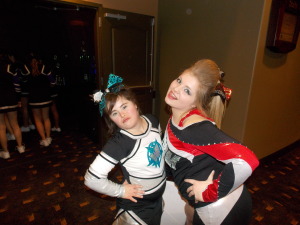
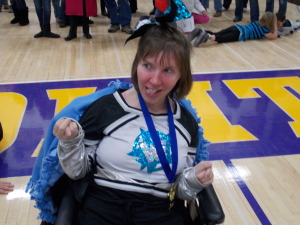
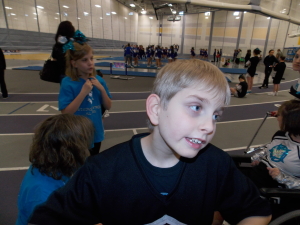
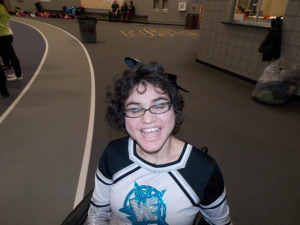

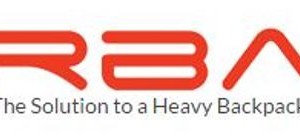

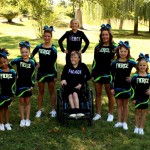
This was very helpful information!! Thank you
Thank you very much, Rosie! If you have questions or need anything, feel free to contact me!
Hey Pam thank you so helpful! I am starting a special needs Pom group at our gym and I’m so excited to get started, and this helped me to know where to start xx
Thank you, Madeline! That is so exciting to hear about the growth of cheer/dance/poms for adapted athletes!!!! I am glad that I could be of some help for you!
Best of luck to you and your team!!
Great insight and very helpful. Thank you!
Thank you for the helpful information . We had are first Pratice today went great . I was wondering if you could point me in the right direction on what we might need to build the gym equipment up to Better help these special kiddos. We want to give the kids the best experience possible .
I created a special needs pep squad at my school and I was wondering how I could expand it to make it bigger!
May I ask how to make a donation to a special needs cheer team in Atlanta?
Do you HAVE to go through USASF to have just a recreational team?